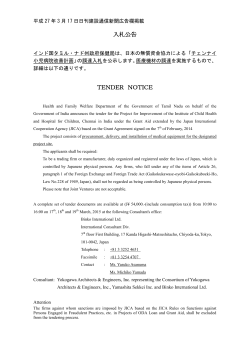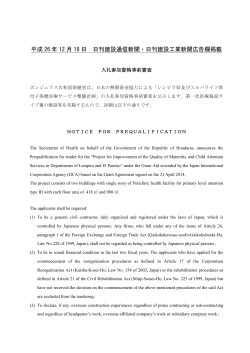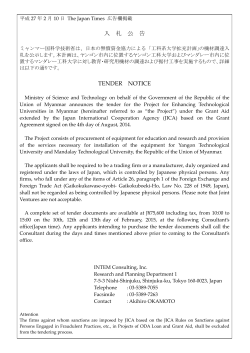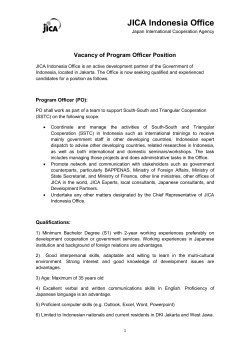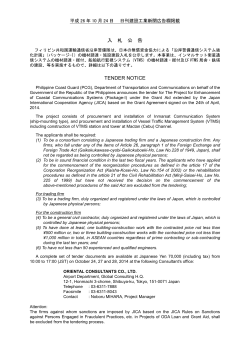
GROUP AND REGION-FOCUSED TRAINING
GROUP AND REGION-FOCUSED TRAINING GENERAL INFORMATION ON Legislative and Electoral Administration 課題別研修「議会運営・選挙管理」 JFY 2015 NO. J1504312/ ID. 1584523 From May 24, 2015 to June 10, 2015 This information pertains to one of the Group and Region-Focused Training of the Japan International Cooperation Agency (JICA), which shall be implemented as part of the Official Development Assistance of the Government of Japan based on bilateral agreement between both Governments. 1/15 I. Concept Background It is essential to improve governance capacity of each country as a foundation for promoting the development of socio-economy of developing country. JICA has been supporting democratization in the field such as national assembles, elections, and media. “Legislative and Electoral Administration” offers the opportunity for learning the way to establish democracy, especially focusing on the stage of election and after that stage. This training program aims to study democratic institutions, including Japanese Diet, election system, and role of media, and to deepen knowledge to take measures towards democratic reform. For what? The main purpose of this training course is to develop capacity of participants in order to take measures towards democratic reforms for their countries. For whom? Senior official (director level) of Election Commission or National Assembly Secretariat, who is in the position of decision making and management. How? This training course provides an opportunity to compare and deepen knowledge about mechanism of national assemblies, fair administration of elections, and independent media reports in Japan and participating countries as well as to consider measures to deal with them by way of discussion with other training participants. Applying this knowledge, participants draft an Action Plan to tackle with issues they face. 2/15 II. Description 1. Title(J-No.) : Legislative and Electoral Administration (J15-04312) 2. Course Period in JAPAN May 24th to June 10th, 2015 3. Target Regions or Countries Egypt, Jordan, Kyrgyz Republic, Maldives, Myanmar, Nepal, Palestinian Authority, Samoa, Yemen 4. Eligible / Target Organization This program is designed for National Assembly Secretariat and Election Commission 5. Course Capacity (Upper limit of Participants) 15 participants 6. Language to be used in this program: English 7. Course Objective: Participants understand appropriate mechanism of national assembly, fair administration of elections, and independent media reports. Applying this knowledge, participants draft an Action Plan to tackle with issues they face. 3/15 8. Expected Module Output and Contents: This program consists of the following components. Details on each component are given below: (1) Preliminary Phase in a participant’s home country (April 2015 to May 2015) Participating organizations make required preparation for the Program. Expected Module Activities Output Formulation and submission of Country Report. Country Report Preparation for presentation of Country Report in Japan. (2) Core Phase in Japan (May 24th to June 10th, 2015) Participants dispatched by the organizations attend the Program implemented in Japan. Expected Module Output Subjects/Agendas Methodology To understand and explain functions of ・Lectures: Japanese democracy, role national assembly, Lectures, of political party Discussions learning the overview ・ Site visits: Japanese Diet, local and Site visits and workings of assembly Japanese Diet and its secretariat To know fair management of elections and explain electoral administration ・ Lectures: Japanese electoral administration, electoral system, Lectures, Discussions election crimes, political funds control ・ Site visits: the poll, ballot-counting and Site visits place To deepen knowledge of media reports which are highly ・Lectures: Japanese media reports Lectures, independent of ・ Site visits: Japan Broadcasting Discussions, government, and and Site visits Corporation(NHK) compare with the ones in participants' country 4/15 To draft an Action Plan to tackle with issues participants face on legislative and electoral administration Formulation of ・ Formulation of Action Plan and final Action Plan, Presentation, presentation and Discussions Note: The above contents may be subject to change. 5/15 <Structure of the program> 1. Preliminary phase (activities in your home country): Formulation for presentation of Country Report 2. Core Phase (activities in Japan): 1st week (May 25-29) (1) Country Report Presentation (2) Lectures & Discussions (3) Site Visits 2nd week (June 1-7) (1) Lectures & Discussions (2) Site Visits and Local Trip (3) Preparation of Final Presentation 3rd week (June 8-9) (1)Final Presentation ※For your information, please see Page 7-8 for the program schedule of last year. Note: The above contents may be subject to change. 6/15 Program Schedule for JPY 2014 Date AM 1 PM AM 2 PM AM 3 PM AM 4 PM AM 5 Program Time Briefing Program Orientation Presentation : Country Reports by participants Lecture : Democracy, The Japanese Experience 1 Lecture : Principles of Democracy and Election Lecture : Government Administration in Japan : system and reality Courtesy Call : Liberal Democratic Party Lecture : Overview of the Diet Observation : the House of Councilors Lecture : The Role of Political Parties in the Democracies Lecture : Election Administration of Japan Lecture : Electoral Systems Lecture : Measures against Election Violations by Japanese Police Lecture : Election Administration of Local Government, Elections of Tokyo PM Metropolitan Assembly Briefing on Study Trip to Hiroshima 6 PM Observation : Hiroshima Peace Memorial Museum Lecture : Roles and Powers of Local Assemblies 7 AM Observation : Hiroshima Prefectural Assembly Room Courtesy Call : President of Hiroshima Prefectural Assembly AM 8 PM AM 9 PM AM 10 PM AM 11 PM Courtesy Call : Democratic Party of Japan Lecture : Roles of Secretaries of National Diet Members Lecture : Democracy, The Japanese Experience 2 Lecture : The Role of Mass Media (Newspaper and Magazines) in Democratic Politics Lecture : The Role of Mass Media (Public Broadcasting) in Democratic Politics Observation : NHK Broadcasting Station Lecture : Use of the Internet in Election Campaigns Case Study 1 : LDC, Africa Case Study 2 : Developed country, Japan Lecture : Political Fund Control Law and Publicly Managed Elections Lecture : JICA's Assistance for Democratization Lecture : Voter Education in Democracies 12 AM Observation : Polling Station Preparation (Nakano City Mayoral Election) 13 AM Observation : Voting (Nakano City Mayoral Election) 14 AM Observation : Vote Counting (Nakano City Mayoral Election) 7/15 PM AM 15 PM Lecture : E-Government Discussion : What we learned in Japan Presentation of Action Plans by Participants Evaluation Meeting Closing Ceremony 8/15 III. Conditions and Procedures for Application 1. Expectations for the Participating Organizations: (1) This program is designed primarily for organizations that intend to address specific issues or problems identified in their operations. Applying organizations are expected to use the program for those specific purposes. (2) In this connection, applying organizations are expected to nominate the most qualified candidates to address the said issues or problems, carefully referring to the qualifications described in sectionⅢ-2 below. (3)Applying organizations are also expected to be prepared to make use of knowledge acquired by the nominees for the said purpose. 2. Nominee Qualifications: Applying Organizations are expected to select nominees who meet the following qualifications. (1) Current Duties: Applicants should, in principle, be a senior official of National Assembly Secretariat or Election Commission at the level of director or in a higher level who is in the position of decision making and management. (2) Educational Background: be a graduate of university or the equivalent. (3) Language: have a sufficient command of oral and written English (This training includes active participation in discussions and presentation, thus requires good English ability. Please attach an official certificate for English ability such as IELTS, TOEFL, TOEIC, if possible) (4) Health: must be in good health, both physically and mentally, to participate in the Program in Japan. (5) Must not be serving any form of military service. (6) Applications by those who have participated in this or similar course in the previous year or before will not be considered. 3. Required Documents for Application (1) Application Form: The Application Form is available at the JICA office (or the Embassy of Japan). *Pregnancy Pregnant participants are strictly requested to attach the following documents in order to minimize the risk for their health. ① letter of the participant’s consent to bear economic and physical risks ② letter of consent from the participant’s supervisor ③ doctor’s letter with permission of his/her training participation. Please ask JICA Staff for the details. 9/15 (2) Photocopy of passport: to be submitted with the application form, if you possess your passport which you will carry when entering Japan for this program. If not, you are requested to submit its photocopy as soon as you obtain it. *Photocopy should include the followings: Name, Date of birth, Nationality, Sex, Passport number and Expire date. (3) Country Report: The applicants should submit the “Country Report” together with the Application Form. It will be used for selection of participants and will be a material for the scheduled session “Presentation and Discussion based on the Country Report by Participants” at the beginning of the training. The instructions of the Country Report are shown in the page 13, ANNEX: Guidelines for Country Report. (4) Organization Chart: The applicants must submit an Organization Chart of the applicant’s organization together with the Application Form. Please clearly indicate the applicant’s position on the chart. Submission of Organization Chart is considered to be an important factor in the selection process of participants. 4. Procedure for Application and Selection: (1) Submission of the Application Documents: Closing date for applications: Please inquire to the JICA office (or the Embassy of Japan). (After receiving applications, the JICA office (or the Embassy of Japan) will send them to JICA Tokyo International Center(JICA TOKYO) in JAPAN by March 27th, 2015) (2) Selection: After receiving the documents through proper channels from your government, the JICA office (or the Embassy of Japan) will conduct screenings, and then forward the documents to JICA TOKYO in Japan. Selection will be made by JICA. (3) Notice of Acceptance: Notification of results will be made by the JICA office (or the Embassy of Japan) not later than April 20th, 2015. 5. Conditions for Attendance: (1) to strictly adhere to the program schedule. (2) not to change the program topics. (3) not to extend the period of stay in Japan. 10/15 (4) not to be accompanied by family members during the program. (5) to return to home countries at the end of the program in accordance with the travel schedule designated by JICA. (6) to refrain from engaging in any political activities, or any form of employment for profit or gain. (7) to observe Japanese laws and ordinances. If there is any violation of said laws and ordinances, participants may be required to return part or all of the training expenditure depending on the severity of said violation. (8) to observe the rules and regulations of the accommodation and not to change the accommodation designated by JICA. 11/15 IV. Administrative Arrangements 1. Organizer: (1) Name: JICA Tokyo (2) Contact: Ms. TANAKA Yuki (tictip@jica.go.jp) 2. Travel to Japan: (1) Air Ticket: The cost of a round-trip ticket between an international airport designated by JICA and Japan will be borne by JICA. (2) Travel Insurance: Coverage is from time of arrival up to departure in Japan. Thus traveling time outside Japan will not be covered. 3. Accommodation in Japan: JICA will arrange the following accommodations for the participants in Japan: JICA Tokyo International Center (JICA TOKYO) Address: 2-49-5 Nishihara, Shibuya-ku, Tokyo 151-0066, Japan TEL: 81-3-3485-7051 FAX: 81-3-3485-9655 (where “81” is the country code for Japan, and “3” is the local area code) Please refer to facility guide of JICA TOKYO at its URL, http://www.jica.go.jp/english/contact/domestic/pdf/welcome.pdf If there is no vacancy at JICA TOKYO, JICA will arrange alternative accommodations for the participants. 4. Expenses: The following expenses will be provided for the participants by JICA: (1) Allowances for accommodation, living expenses, outfit, and shipping (2) Expenses for study tours (basically in the form of train tickets) (3) Free medical care for participants who become ill after arriving in Japan (costs related to pre-existing illness, pregnancy, or dental treatment are not included) (4) Expenses for program implementation, including materials For more details, please see “III. ALLOWANCES” of the brochure for participants titled “KENSHU-IN GUIDE BOOK,” which will be given before departure for Japan. 5. Pre-departure Orientation: A pre-departure orientation will be held at the respective country’s JICA office (or Japanese Embassy), to provide participants with details on travel to Japan and other matters. V. Other Information Those who have their own laptop computer are recommended to bring when coming to Japan in order to formulate and/or revise the Country Report and Final Presentation. 12/15 ANNEX: Guidelines for Country Report -Preliminary Phase in a participant’s home country Preparation of the Individual Presentation Paper Before coming to Japan, (1) Each applicant is required to prepare the Country Report as described in III-3-(3). Country reports will be shared among the participants at the beginning stage of the training in Japan. (2) Country Report should be about 8 pages in length and typewritten on a personal computer with MS-Word, A4-Size (21 cm × 30 cm) or PowerPoint. (3) You are encouraged to attach relevant reference materials and data (organizational chart, statistical data, etc.) so that other participants would clearly and easily understand the situation of your country. (4) Each country will have approximately 15 minutes for his/her or their presentation. (5) PC (PowerPoint) and audio equipment are available for presentation purposes. The use of PowerPoint is not mandatory but is highly recommended. The following topics should be included: Part I:Current Election and Parliamentary Systems Part II:Challenges or Problems 1) Challenges and Problems What are the challenges/problems you would like to tackle with, or situations you would like to improve? 2) Backgrounds, causes and obstacles What are the backgrounds behind the challenges or problems you face? What do you think are the causes of your problems, and what prevents from their improvement? *on the first page of the report, please include “Name of training course”, “Name of Participant”, “Name of Country”, and “the title of the Report”. 13/15 For Your Reference JICA and Capacity Development The key concept underpinning JICA operations since its establishment in 1974 has been the conviction that “capacity development” is central to the socioeconomic development of any country, regardless of the specific operational scheme one may be undertaking, i.e. expert assignments, development projects, development study projects, training programs, JOCV programs, etc. Within this wide range of programs, Training Programs have long occupied an important place in JICA operations. Conducted in Japan, they provide partner countries with opportunities to acquire practical knowledge accumulated in Japanese society. Participants dispatched by partner countries might find useful knowledge and re-create their own knowledge for enhancement of their own capacity or that of the organization and society to which they belong. About 460 pre-organized programs cover a wide range of professional fields, ranging from education, health, infrastructure, energy, trade and finance, to agriculture, rural development, gender mainstreaming, and environmental protection. A variety of programs are being customized to address the specific needs of different target organizations, such as policy-making organizations, service provision organizations, as well as research and academic institutions. Some programs are organized to target a certain group of countries with similar developmental challenges. Japanese Development Experience Japan was the first non-Western country to successfully modernize its society and industrialize its economy. At the core of this process, which started more than 140 years ago, was the “adopt and adapt” concept by which a wide range of appropriate skills and knowledge have been imported from developed countries; these skills and knowledge have been adapted and/or improved using local skills, knowledge and initiatives. They finally became internalized in Japanese society to suit its local needs and conditions. From engineering technology to production management methods, most of the know-how that has enabled Japan to become what it is today has emanated from this “adoption and adaptation” process, which, of course, has been accompanied by countless failures and errors behind the success stories. We presume that such experiences, both successful and unsuccessful, will be useful to our partners who are trying to address the challenges currently faced by developing countries. However, it is rather challenging to share with our partners this whole body of Japan’s developmental experience. This difficulty has to do, in part, with the challenge of explaining a body of “tacit knowledge,” a type of knowledge that cannot fully be expressed in words or numbers. Adding to this difficulty are the social and cultural systems of Japan that vastly differ from those of other Western industrialized countries, and hence still remain unfamiliar to many partner countries. Simply stated, coming to Japan might be one way of overcoming such a cultural gap. JICA, therefore, would like to invite as many leaders of partner countries as possible to come and visit us, to mingle with the Japanese people, and witness the advantages as well as the disadvantages of Japanese systems, so that integration of their findings might help them reach their developmental objectives. 14/15 CORRESPONDENCE For enquiries and further information, please contact the JICA office or the Embassy of Japan. Further, address correspondence to: JICA Tokyo International Center (JICA TOKYO) Address: 2-49-5 Nishihara, Shibuya-ku, Tokyo 151-0066, Japan TEL: +81-3-3485-7051 FAX: +81-3-3485-9655 15/15
© Copyright 2025
